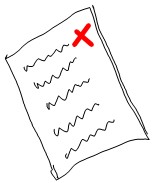Assessment is difficult. Whatever “solutions” you might come across, unless you can open up someone’s brain and work out what’s been going on, assessment will always be a “best estimate” situation.
And “21st century learning and teaching” has, arguably, made matters worse. After all, in the old days, all a student had to do was listen to the teacher, take notes, learn the notes and reproduce the notes from memory. I know it wasn’t quite as simple as that, but there certainly wasn’t the same degree of collaborative and connected learning there is these days. (In my case, for example, learning from people overseas consisted of corresponding, by letter, with a merchant ship. The letters took six weeks to arrive at their destination!)
 Now, you might think that none of this would matter very much if you teach your children at home, but as Ashley Allain will explain this evening, in the USA (and in the UK and elsewhere), home-schoolers do have to meet very stringent standards. But Ashley is interested in going beyond the narrow confines of what has to be done, and is concerned with what ought to be done. She says that assessment needs to be able to inform us whether:
Now, you might think that none of this would matter very much if you teach your children at home, but as Ashley Allain will explain this evening, in the USA (and in the UK and elsewhere), home-schoolers do have to meet very stringent standards. But Ashley is interested in going beyond the narrow confines of what has to be done, and is concerned with what ought to be done. She says that assessment needs to be able to inform us whether:
our children have moved beyond a basic mastery of material towards a deeper, richer level of understanding.
She goes further:
Teaching and assessment should be intertwined not separate functions.
This is a very fundamental point. How can you have a curriculum and a learning environment which encourage discussion, problem-solving and project work, and then carry out paper-based assessment (by which I also mean the computerised versions of paper tests)?
If assessment for learning, multiple learning styles, and the challenges of assessment in a 21st century, technology-rich environment are issues which exercise you, as well as how to integrate the use of technology in the curriculum in a meaningful and exciting way, then do join us this evening for a free talk and discussion with Ashley. Here are the details:
Ashley Allain, a homeschooling mom in the USA who uses technology across all subjects, will be giving a talk. It should be very interesting and enlightening. You can join that discussion here. (All sessions start promptly at 7pm UK time unless otherwise stated, although you may enter a few minutes early if you wish. Here’s a world clock for colleagues who will be outside the UK at the time. The session will be hosted until 8pm, but the room won’t be closed until 9:30pm for colleagues who wish to continue the discussion.) Please note that the session, including participants’ contributions, will be recorded.

